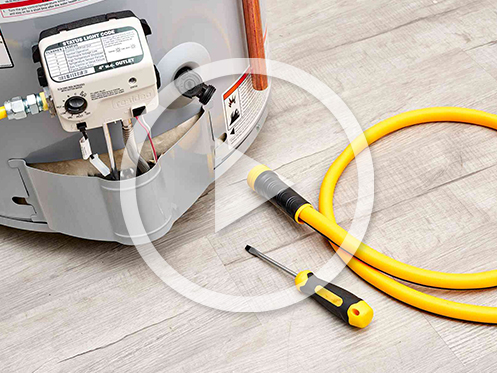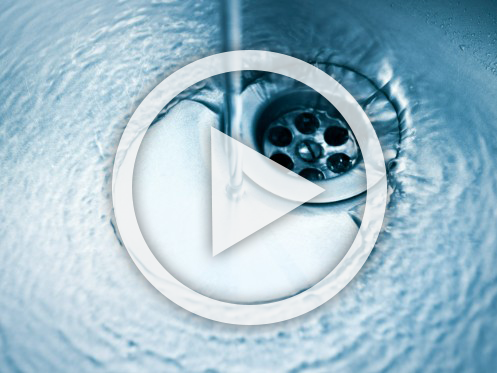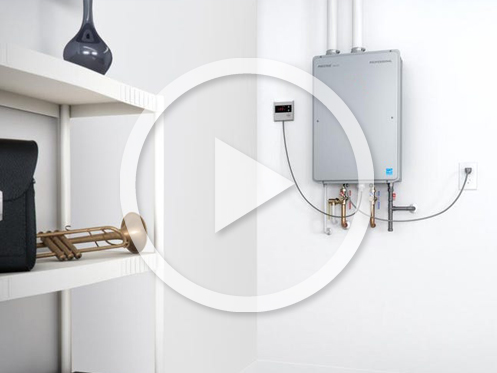Updated February 1, 2024
For most homeowners in the United States, their water heater is an essential piece of equipment. Yet few people know very much about these systems or how they work. Plus, it’s hard to find a technician who truly knows about water heaters, as they are both a part of your plumbing system and a heating device in their own right. Fortunately, our skilled pros at Golden Rule are backed by over 20 years of experience, so we know almost everything there is to know about water heaters—and all the issues associated with them. Keep reading for answers to all your top water heater FAQs and remember that Golden Rule is here for all your essential plumbing, heating, cooling and electrical needs.
The Top 7 Questions About Water Heaters:
-
- How Many Types of Water Heaters Are There? The two main types of water heaters are traditional and tankless. Traditional water heaters, as you may have guessed, store water in a tank, heating it for your use when you turn on your taps. With tankless water heaters, on the other hand, your water is warmed by a gas burner or electric heating element as it moves through your pipes, allowing you to receive a continuous supply of hot water on demand. There is technically a third type, the heat pump water heater, which can be a stand-alone water heating system or a combination water heating and space conditioning system.
- Is One Type of Water Heater Better than the Other? The answer to this question depends almost entirely on what your needs are as a homeowner. Traditional water heaters have a much lower installation cost and are easier to take care of when repair needs pop up. However, traditional water heaters tend to be less energy-efficient than tankless models, as they store your water in a tank and have to reheat it again and again. Tankless water heaters, despite having a higher installation cost upfront, can save you a lot of money on utility bills, because they do not expend energy repeatedly reheating your water (the same is true for heat pump water heaters.) They are also easy to access because of their small size, and while tankless water heater repairs tend to be more expensive than traditional water heater repairs, they are also usually less frequent. Tankless systems have a longer lifespan, too.
- What Size Water Heater Should I Buy? No matter what type of house you live in, the size of your home, and your family, play a significant part in what kind of water heater you need. Larger households require water heaters with larger tanks. As a general rule of thumb, a home with two occupants will require a water heater tank that holds 23-36 gallons at a time. If you live in a house with a lot of residents, as in five people or more, you will want to install a water heater that can hold at least 56 gallons. Tankless water heater output, meanwhile, is not based on gallon size, as there are no gallons to store. Instead, tankless heater capacity is passed on by flow rate, i.e., the speed at which the system can dispense water. The more fixtures and appliances you have, and the more likely you are to be using those fixtures and appliances simultaneously, the higher GPM (gallons per minute) rate your water heater will require to meet your needs. Because it can be difficult to find a water heater with a high enough GPM to sustain, for example, two people showering at once, tankless heaters have traditionally been less popular in larger households. That said, thanks to recent advances in technology, tankless systems are starting to become a valid option for big houses, too.
- When Is It Time to Replace My Water Heater? While there is a myriad of factors to consider when weighing whether to replace your water heater, the most important one tends to be age. Traditional water heaters generally have a lifespan of 10-15 years, while tankless systems can last 20 years or more. However, your water heater may wear down earlier depending on the quality of your water heater. For instance, if you live in a home with hard water, you may be forced to replace your unit sooner rather than later, as the mineral content in hard water can lead to significant sediment build-up and wear down your water heater tank (assuming you have a traditional system) at a faster rate. To keep your water heater running as long as possible, make sure to periodically replace the anode rod, which is in place to stop corrosion and protect the metal lining of your water heater. In addition to sediment build-up and age, other signs it may be time to upgrade your water heater include leaks, strange noises and smells, rust-colored water, and a longer wait time for your water heater to get hot. In general, if you want to maximize the lifespan of your system, the best thing you can do is to call a professional for periodic water heater maintenance. This may include flushing out the tank if you have a traditional system, or making other repairs designed to keep your unit functioning at a high-efficiency rate. If you do live in a home with hard, mineral water, you should also consider installing a water treatment system, which will not only improve the taste of your water but reduce the level of corrosion in your water heater tank.
- How Do I Measure My Water Heater’s Efficiency: Your water heater’s EF, or Energy Factor rating, is the measurement of its overall energy efficiency. EF is calculated by comparing the total amount of energy it takes to heat your water with the unit’s daily energy consumption. The higher your water heater’s EF rating is, the lower your operating costs will usually be. While water heaters with a higher EF are generally more expensive to install, they are often a good investment because of the long-term savings they provide in utility bills. It is also worth mentioning that different water heaters will have different EFs depending on their fuel types. Tank heaters can be powered by natural gas, electricity, oil, propane, and solar power. Tankless models, for the most part, can only be powered by natural gas or electricity. Size is also a factor in EF, which is why smaller, tankless units – especially when used in smaller homes – tend to be so energy-efficient.
- If I Just Moved into a New Home, Do I Need to Replace the Water Heater? That depends; have you checked the serial number? If you cannot ascertain the age of your water heater from the previous owner, check for this somewhere on the unit. The serial number will generally tell you the age of your water heater, and therefore, be able to provide you some insight into whether it needs to be replaced.
- Can Water Heaters Be Dangerous/Can They Explode? Technically, yes. Electric and gas water heaters can explode, if the temperature and pressure relief valves malfunction. You will also want to watch out for gas leaks if gas is the fuel that your unit runs on. However, the good news is that these problems are extremely rare—especially if you call an experienced technician right away when something seems off with your unit. With regular water heater repairs and maintenance, your household will remain completely safe, and your water heater will run at maximum efficiency for years to come.
For all your other questions about water heaters and more, just call Golden Rule. We are available by phone at 515-393-4526, or you can send us a message online.
Contact Us Today for Plumbing Service!
If you found this post helpful, check out some other budget-saving tips:


Why Does Your Water Heater Take Forever to Warm Up? Let’s Fix It! Hey there, fellow homeowner! Have you ever noticed that when you turn on... Read More

Why Test Your Home’s Water? A Golden Rule Perspective Hey there, fellow homeowner! Have you ever wondered about the quality of the water flowing through your pipes?... Read More

Hey there, homeowner! Have you ever been in the middle of a soothing hot shower, only to have the water turn icy cold? It’s a bummer. Well,... Read More
